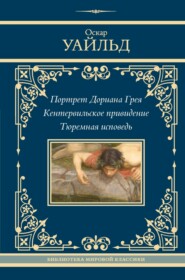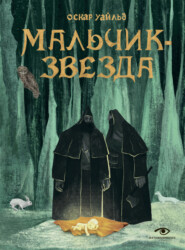По всем вопросам обращайтесь на: info@litportal.ru
(©) 2003-2025.
✖
Lord Arthur Savile's Crime; The Portrait of Mr. W.H., and Other Stories
Настройки чтения
Размер шрифта
Высота строк
Поля
Affable familiar ghost
Which nightly gulls him with intelligence,
was the Mephistopheles of his Doctor Faustus. No doubt, Marlowe was fascinated by the beauty and grace of the boy-actor, and lured him away from the Blackfriars Theatre, that he might play the Gaveston of his Edward II. That Shakespeare had the legal right to retain Willie Hughes in his own company is evident from Sonnet LXXXVII., where he says: —
Farewell! thou art too dear for my possessing,
And like enough thou know’st thy estimate:
The charter of thy worth gives thee releasing;
My bonds in thee are all determinate.
For how do I hold thee but by thy granting?
And for that riches where is my deserving?
The cause of this fair gift in me is wanting,
And so my patent back again is swerving.
Thyself thou gayest, thy own worth then not knowing,
Or me, to whom thou gavest it, else mistaking;
So thy great gift, upon misprision growing,
Comes home again, on better judgement making.
Thus have I had thee, as a dream doth flatter,
In sleep a king, but waking no such matter.
But him whom he could not hold by love, he would not hold by force. Willie Hughes became a member of Lord Pembroke’s company, and, perhaps in the open yard of the Red Bull Tavern, played the part of King Edward’s delicate minion. On Marlowe’s death, he seems to have returned to Shakespeare, who, whatever his fellow-partners may have thought of the matter, was not slow to forgive the wilfulness and treachery of the young actor.
How well, too, had Shakespeare drawn the temperament of the stage-player! Willie Hughes was one of those
That do not do the thing they most do show,
Who, moving others, are themselves as stone.
He could act love, but could not feel it, could mimic passion without realising it.
In many’s looks the false heart’s history
Is writ in moods and frowns and wrinkles strange,
but with Willie Hughes it was not so. ‘Heaven,’ says Shakespeare, in a sonnet of mad idolatry —
Heaven in thy creation did decree
That in thy face sweet love should ever dwell;
Whate’er thy thoughts or thy heart’s workings be,
Thy looks should nothing thence but sweetness tell.
In his ‘inconstant mind’ and his ‘false heart,’ it was easy to recognise the insincerity and treachery that somehow seem inseparable from the artistic nature, as in his love of praise that desire for immediate recognition that characterises all actors. And yet, more fortunate in this than other actors, Willie Hughes was to know something of immortality. Inseparably connected with Shakespeare’s plays, he was to live in them.
Your name from hence immortal life shall have,
Though I, once gone, to all the world must die:
The earth can yield me but a common grave,
When you entombed in men’s eyes shall lie.
Your monument shall be my gentle verse,
Which eyes not yet created shall o’er-read,
And tongues to be your being shall rehearse,
When all the breathers of this world are dead.
There were endless allusions, also, to Willie Hughes’s power over his audience – the ‘gazers,’ as Shakespeare calls them; but perhaps the most perfect description of his wonderful mastery over dramatic art was in A Lover’s Complaint, where Shakespeare says of him: —
In him a plenitude of subtle matter,
Applied to cautels, all strange forms receives,
Of burning blushes, or of weeping water,
Or swooning paleness; and he takes and leaves,
In either’s aptness, as it best deceives,
To blush at speeches rank, to weep at woes,
Or to turn white and swoon at tragic shows.
* * * * *
So on the tip of his subduing tongue,
All kind of arguments and questions deep,
All replication prompt and reason strong,
For his advantage still did wake and sleep,
To make the weeper laugh, the laugher weep.
He had the dialect and the different skill,
Catching all passions in his craft of will.
Once I thought that I had really found Willie Hughes in Elizabethan literature. In a wonderfully graphic account of the last days of the great Earl of Essex, his chaplain, Thomas Knell, tells us that the night before the Earl died, ‘he called William Hewes, which was his musician, to play upon the virginals and to sing. “Play,” said he, “my song, Will Hewes, and I will sing it to myself.” So he did it most joyfully, not as the howling swan, which, still looking down, waileth her end, but as a sweet lark, lifting up his hands and casting up his eyes to his God, with this mounted the crystal skies, and reached with his unwearied tongue the top of highest heavens.’ Surely the boy who played on the virginals to the dying father of Sidney’s Stella was none other but the Will Hews to whom Shakespeare dedicated the Sonnets, and who he tells us was himself sweet ‘music to hear.’ Yet Lord Essex died in 1576, when Shakespeare himself was but twelve years of age. It was impossible that his musician could have been the Mr. W. H. of the Sonnets. Perhaps Shakespeare’s young friend was the son of the player upon the virginals? It was at least something to have discovered that Will Hews was an Elizabethan name. Indeed the name Hews seemed to have been closely connected with music and the stage. The first English actress was the lovely Margaret Hews, whom Prince Rupert so madly loved. What more probable than that between her and Lord Essex’s musician had come the boy-actor of Shakespeare’s plays? But the proofs, the links – where were they? Alas! I could not find them. It seemed to me that I was always on the brink of absolute verification, but that I could never really attain to it.
From Willie Hughes’s life I soon passed to thoughts of his death. I used to wonder what had been his end.
Perhaps he had been one of those English actors who in 1604 went across sea to Germany and played before the great Duke Henry Julius of Brunswick, himself a dramatist of no mean order, and at the Court of that strange Elector of Brandenburg, who was so enamoured of beauty that he was said to have bought for his weight in amber the young son of a travelling Greek merchant, and to have given pageants in honour of his slave all through that dreadful famine year of 1606–7, when the people died of hunger in the very streets of the town, and for the space of seven months there was no rain. We know at any rate that Romeo and Juliet was brought out at Dresden in 1613, along with Hamlet and King Lear, and it was surely to none other than Willie Hughes that in 1615 the death-mask of Shakespeare was brought by the hand of one of the suite of the English ambassador, pale token of the passing away of the great poet who had so dearly loved him. Indeed there would have been something peculiarly fitting in the idea that the boy-actor, whose beauty had been so vital an element in the realism and romance of Shakespeare’s art, should have been the first to have brought to Germany the seed of the new culture, and was in his way the precursor of that Aufklärung or Illumination of the eighteenth century, that splendid movement which, though begun by Lessing and Herder, and brought to its full and perfect issue by Goethe, was in no small part helped on by another actor – Friedrich Schroeder – who awoke the popular consciousness, and by means of the feigned passions and mimetic methods of the stage showed the intimate, the vital, connection between life and literature. If this was so – and there was certainly no evidence against it – it was not improbable that Willie Hughes was one of those English comedians (mimæ quidam ex Britannia, as the old chronicle calls them), who were slain at Nuremberg in a sudden uprising of the people, and were secretly buried in a little vineyard outside the city by some young men ‘who had found pleasure in their performances, and of whom some had sought to be instructed in the mysteries of the new art.’ Certainly no more fitting place could there be for him to whom Shakespeare said, ‘thou art all my art,’ than this little vineyard outside the city walls. For was it not from the sorrows of Dionysos that Tragedy sprang? Was not the light laughter of Comedy, with its careless merriment and quick replies, first heard on the lips of the Sicilian vine-dressers? Nay, did not the purple and red stain of the wine-froth on face and limbs give the first suggestion of the charm and fascination of disguise – the desire for self-concealment, the sense of the value of objectivity thus showing itself in the rude beginnings of the art? At any rate, wherever he lay – whether in the little vineyard at the gate of the Gothic town, or in some dim London churchyard amidst the roar and bustle of our great city – no gorgeous monument marked his resting-place. His true tomb, as Shakespeare saw, was the poet’s verse, his true monument the permanence of the drama. So had it been with others whose beauty had given a new creative impulse to their age. The ivory body of the Bithynian slave rots in the green ooze of the Nile, and on the yellow hills of the Cerameicus is strewn the dust of the young Athenian; but Antinous lives in sculpture, and Charmides in philosophy.
CHAPTER III
After three weeks had elapsed, I determined to make a strong appeal to Erskine to do justice to the memory of Cyril Graham, and to give to the world his marvellous interpretation of the Sonnets – the only interpretation that thoroughly explained the problem. I have not any copy of my letter, I regret to say, nor have I been able to lay my hand upon the original; but I remember that I went over the whole ground, and covered sheets of paper with passionate reiteration of the arguments and proofs that my study had suggested to me. It seemed to me that I was not merely restoring Cyril Graham to his proper place in literary history, but rescuing the honour of Shakespeare himself from the tedious memory of a commonplace intrigue. I put into the letter all my enthusiasm. I put into the letter all my faith.
No sooner, in fact, had I sent it off than a curious reaction came over me. It seemed to me that I had given away my capacity for belief in the Willie Hughes theory of the Sonnets, that something had gone out of me, as it were, and that I was perfectly indifferent to the whole subject. What was it that had happened? It is difficult to say. Perhaps, by finding perfect expression for a passion, I had exhausted the passion itself. Emotional forces, like the forces of physical life, have their positive limitations. Perhaps the mere effort to convert any one to a theory involves some form of renunciation of the power of credence. Perhaps I was simply tired of the whole thing, and, my enthusiasm having burnt out, my reason was left to its own unimpassioned judgment. However it came about, and I cannot pretend to explain it, there was no doubt that Willie Hughes suddenly became to me a mere myth, an idle dream, the boyish fancy of a young man who, like most ardent spirits, was more anxious to convince others than to be himself convinced.
As I had said some very unjust and bitter things to Erskine in my letter, I determined to go and see him at once, and to make my apologies to him for my behaviour. Accordingly, the next morning I drove down to Birdcage Walk, and found Erskine sitting in his library, with the forged picture of Willie Hughes in front of him.
‘My dear Erskine!’ I cried, ‘I have come to apologise to you.’
‘To apologise to me?’ he said. ‘What for?’
‘For my letter,’ I answered.
‘You have nothing to regret in your letter,’ he said. ‘On the contrary, you have done me the greatest service in your power. You have shown me that Cyril Graham’s theory is perfectly sound.’
‘You don’t mean to say that you believe in Willie Hughes?’ I exclaimed.
‘Why not?’ he rejoined. ‘You have proved the thing to me. Do you think I cannot estimate the value of evidence?’
‘But there is no evidence at all,’ I groaned, sinking into a chair. ‘When I wrote to you I was under the influence of a perfectly silly enthusiasm. I had been touched by the story of Cyril Graham’s death, fascinated by his romantic theory, enthralled by the wonder and novelty of the whole idea. I see now that the theory is based on a delusion. The only evidence for the existence of Willie Hughes is that picture in front of you, and the picture is a forgery. Don’t be carried away by mere sentiment in this matter. Whatever romance may have to say about the Willie Hughes theory, reason is dead against it.’
‘I don’t understand you,’ said Erskine, looking at me in amazement. ‘Why, you yourself have convinced me by your letter that Willie Hughes is an absolute reality. Why have you changed your mind? Or is all that you have been saying to me merely a joke?’

















